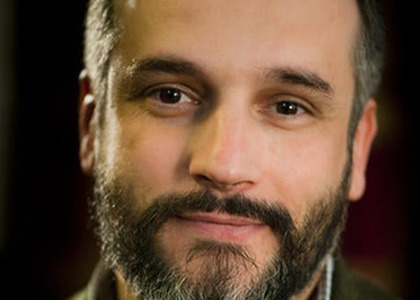> [Archived] Interviews

Interview with Laurentiu Constantin, manager of the Sempre Ensemble
A vocal-instrumental concert dedicated to the Old Music Day, performed by the Sempre Ensemble, will take place on Tuesday the 21st of March at the Auditorium Hall of MNAR.
Mr. Laurențiu Constantin, why did you choose the vocal-instrumental work of composer Georg Friedrich Händel for this event, given that the 21st of March is Johann Sebastian Bach's birthday?
The 21st of March - Johann Sebastian Bach's birthday, as you say, was chosen to celebrate the European Day of Early Music, which has since become Old Music Day, but we don't necessarily need to think of Bach. We held one of our first celebrations, which we called 'Sempre Vivaldi', and last year, we had 'Baroque Unknown' - music by the most unknown composers of European baroque music. The day is just an opportunity to celebrate more than a millennium of early music and musical heritage in Europe.
We have various drawer projects with the "Sempre" Ensemble and, from time to time, one of them is coming ahead of others. Now it's the turn of this programme with Handel.
What can you tell us about the musical programme?
The programme is intended to be a kind of guided journey through the world of sound, more specifically the music of Handel, a composer who is very difficult, if not impossible, to include in a concert. He is an absolutely brilliant, all-round composer who tackled all genres of music - from small, chamber-like, very intimate works to large-scale operatic deployments.
The programme we're proposing - built around concertos for small string ensemble and basso continuo - tries to offer something of what Handel is all about, so that those in the hall get as sparkling a sense of his creation as possible.
How did the collaboration between "Sempre" Ensemble and soprano Cristina Vasilache come about?
It's a small world, where all the musicians know each other more or less, and we are constantly looking for vocal soloists who can satisfy the imperatives of baroque vocal music, which is not at all the same, and even not at all like Italian belcanto, or the needs and vocal technique of Wagner music.
We discovered Cristina after a meeting she had with harpsichordist Raluca Enea, founder of the "Sempre" Ensemble. Cristina Vasilache is a vocal typology suited to this kind of music and has a very good musical science. To perform this music it is not enough to have a very good voice, but you need to know a lot of music, intonation, articulation and phrasing being much more important than the perhaps slightly excessive focus that some singers have on vocal technique. Cristina had all these qualities and she also had the desire to go down this path.
How is an early music ensemble received by the public and what other projects does the Sempre Ensemble have on its agenda?
A few years ago, an early music ensemble - in this case, a baroque ensemble - was seen as something exotic, and even fewer years ago, it was seen as a fad. Why do I say that? Because, for example, Johann Sebastian Bach never wrote anything for piano. We don't deal with piano music because there is no such music in the Baroque area. To many people, our insistence on making Baroque music and early music in general, only on copies of the instruments for which those scores were written and only in the manner in which they were written, seemed like a fad. In the meantime, they got used to this state and this way of making music - which we consider the state of normality - and began to come closer to understanding and feeling this music. The slogan of our festival (Bucharest Old Music Festival) is a motto and a creed under which all our activity is conducted - "discover the novelty of old music".
This music that we deal with has nothing to do with musical archaeology, but with the freshness of discovery. If in 30, 40 or 50 years' time I am not at all sure that today's pop star hits will still be played, I can be sure that Baroque music and Bach's work will still be played in 300 years' time, as we play it today, 300 years after it was written.
Translated by Andreea-Iulia Ciucă,
University of Bucharest, Faculty of Foreign Languages and Literatures, MTTLC, year I
Corrected by Silvia Petrescu














